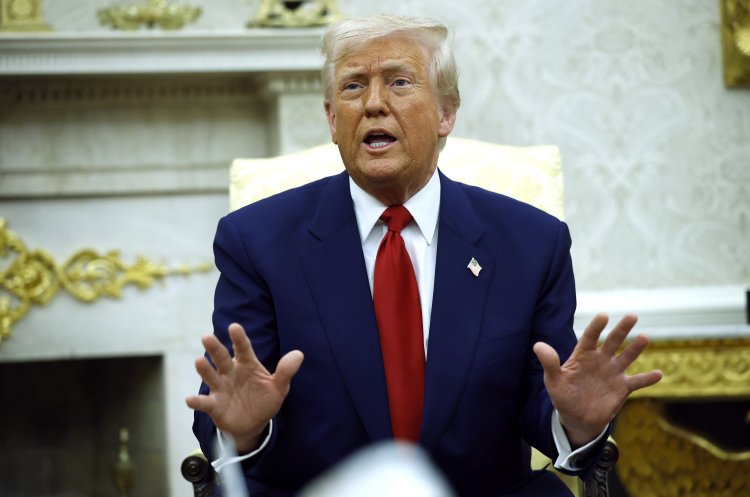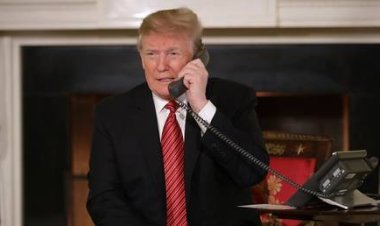‘The opposite of what Americans voted for’: Market unrest sparks backlash against Trump
Amid the tumultuous market conditions triggered by Trump's tariffs, the president is experiencing the strongest backlash of his presidency from members of the GOP.

Now, however, Trump allies and GOP voters rattled by the market downturn due to tariffs are collectively voicing a different sentiment: No, we didn’t.
Trump’s victory in November was largely attributed to voters who viewed him as a solution to their economic troubles. Throughout his campaign, he repeatedly pledged to reduce everyday prices for Americans. Yet, as president, he has opted to lead the country into further financial turmoil while declaring that the market downturn caused by his tariffs is “medicine” that Americans must accept.
“Trump was elected in part to lower inflation and juice the economy," remarked GOP pollster Whit Ayres. "Higher prices and slower growth are exactly the opposite of what Americans voted for.”
The economic instability instigated by the administration's broad tariffs is causing alarm within all factions of the Republican Party. Concerned officials fear that the administration's approach may be pushing the U.S. towards a recession, jeopardizing the GOP’s prospects in upcoming midterm elections, while lacking clarity on how to persuade Trump to alter his direction.
Wall Street executives, who previously supported Trump's election in anticipation of economic growth, are now beginning to express their worries, publicly pressing the administration to temper its trade conflict. Republican lawmakers, responding to the fluctuations in the stock market, are preparing for the potential political repercussions as their constituents' retirement accounts dwindle and hiring slows.
Furthermore, within Trump's inner circle, there is a growing fear that if he continues with his tariff policies, a segment of his voter base might turn away from him.
“It’s a question of what the pain threshold is for the American people and the Republican voters,” noted Stephen Moore, an economic advisor to Trump who has been critical of his aggressive trade strategy. “We’ve all lost a lot of money.”
This reaction represents one of the most consistent criticisms Trump has encountered from within the GOP, which has largely catered to his unpredictable leadership style up until now. It comes at a crucial juncture in Trump's presidency, as he nears the 100-day mark, having focused extensively on reshaping significant aspects of American society to fit his agenda.
To this point, Trump has managed to keep Republicans united behind his bold initiatives, even as he engages in a drastic overhaul of the federal workforce, disregards due process in his mass deportation efforts, and erodes Congressional authority. GOP officials have mostly dismissed concerns about the disruption these decisions have caused, brushing aside apprehensions regarding Trump’s expansive use of executive power and referencing polling that suggests a substantial segment of Republican voters backs his plans.
However, the financial distress of recent weeks appears to be testing the limits of party loyalty. As the stock market fluctuated dramatically, Republican lawmakers began calling on the White House to reconsider its tariffs, with Sen. Ted Cruz of Texas, a steadfast Trump supporter, criticizing “the voices in the White House that want high tariffs forever.”
“It’s unnerving for people that like steadiness,” said Matt Schlapp, a Trump ally and chairman of the American Conservative Union, who indicated he has received anxious communications from Trump supporters and associates over the weekend. Nevertheless, Schlapp remains loyal to Trump, asserting, “For the country, if we don’t do some hard things that make people nervous to avoid that short-term pain, we’ll never get the country on the right path.”
Despite the increasing concerns, Trump has demonstrated little inclination to retreat from his tariff stance, repeatedly asserting their importance to his economic vision. On Monday, he announced intentions to veto bipartisan legislation that would grant Congress the authority to eliminate the tariffs, subsequently quashing expectations that he would agree to halt them during negotiations with various nations.
“We are not looking at that,” Trump stated in the Oval Office, proudly calling it an “honor” to engage in a global trade war.
Allies within the White House have also minimized the backlash, insisting that Trump is merely following through on his campaign promises, and that voters are prepared to endure temporary hardship for the sake of encouraging companies to relocate operations back to the U.S. Long-term electoral implications for Trump, who may prioritize his vision for American governance over potential short-term ramifications, are not as straightforward.
Indeed, Trump indicated his plans for widespread tariffs long before taking office. However, few within the GOP or the business realm expected him to follow through, and concerns are mounting that voters may not be as resilient in withstanding the financial repercussions as they might have suggested in November.
Many of Trump’s advisors privately believe that the president will ultimately pursue a negotiated conclusion to the tariff dispute, according to another close ally who spoke anonymously about ongoing discussions aimed at calming anxious legislators and GOP officials.
Nonetheless, the conditions under which Trump might agree to negotiations remain unclear, as does the extent of economic turmoil necessary to prompt a change.
Even before the administration enacted broad tariffs, Trump's approval ratings regarding economic matters had significantly decreased, with a late March survey indicating that over 40 percent of voters felt his policies had worsened their financial situations.
Republicans are now apprehensive that the fallout from the recent market panic, which has triggered fears of a recession, will further diminish these approval ratings.
“The American people voted for tariffs,” asserted Jessica Riedl, a senior fellow at the conservative Manhattan Institute. “But if voters didn’t vote for something, it’s the S&P [500] dropping 19 percent. And that’s causing voters to reassess the policies as well as reassess the president who refuses to respond to economic reality.”
Riedl warned that if Trump persists on his current trajectory, the economic consequences are poised to worsen significantly before any improvements emerge, anticipating that businesses will soon confront increased costs due to new tariffs, leading to sharp price increases and escalated layoffs.
Unlike much of the upheaval associated with Trump's early presidency, the financial repercussions are likely to directly impact every American — potentially stirring up the kind of voter dissatisfaction that helped propel Republicans to power last November and could just as easily unseat them in the midterms.
“Almost every issue that Trump ran on was kind of a unifying message for Republicans,” Moore observed. “This is the one issue that divides the party.”
Anna Muller for TROIB News
Find more stories on Business, Economy and Finance in TROIB business












